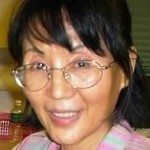 I have been trying to make some sense of my wife’s abrupt passing after a lifetime of perfect health. She was diagnosed on February 25, 2015, rudely, shockingly, and unprofessionally told by a CT scan technician that she had four weeks to live, and passed away on March 22, 2015, the Chinese celebration day of Guan Yin Bodhisattva. (She was Chinese and Guan Yin was her ideal). I read up on pancreatic cancer after she passed away and learned that those at most risk from that extremely aggressive cancer are smokers, alcoholics, the obese, diabetics and persons with a family history of the disease. She never smoked and she worked in smoke-free workplaces, as most of us do. She never drank anything with alcohol in it; she was a green tea drinker and a vegetarian. She was skinny all her life, never getting over 100 pounds except on two occasions four years apart: When pregnant with our two daughters. She was not diabetic, had no family history of pancreatic cancer, and was a devout, practicing Buddhist. She was Guan Yin.So one day while still in shock and denial I picked up a book written by the venerable Ajahn Sumedho (The Mind and the Way; Buddhist Reflections on Life) and turned to the chapter entitled “Kamma and Rebirth.” Here are the first two paragraphs of that chapter: I have been trying to make some sense of my wife’s abrupt passing after a lifetime of perfect health. She was diagnosed on February 25, 2015, rudely, shockingly, and unprofessionally told by a CT scan technician that she had four weeks to live, and passed away on March 22, 2015, the Chinese celebration day of Guan Yin Bodhisattva. (She was Chinese and Guan Yin was her ideal). I read up on pancreatic cancer after she passed away and learned that those at most risk from that extremely aggressive cancer are smokers, alcoholics, the obese, diabetics and persons with a family history of the disease. She never smoked and she worked in smoke-free workplaces, as most of us do. She never drank anything with alcohol in it; she was a green tea drinker and a vegetarian. She was skinny all her life, never getting over 100 pounds except on two occasions four years apart: When pregnant with our two daughters. She was not diabetic, had no family history of pancreatic cancer, and was a devout, practicing Buddhist. She was Guan Yin.So one day while still in shock and denial I picked up a book written by the venerable Ajahn Sumedho (The Mind and the Way; Buddhist Reflections on Life) and turned to the chapter entitled “Kamma and Rebirth.” Here are the first two paragraphs of that chapter:
We can speculate about kamma (Skt. karma) and rebirth, but all we can know directly is whether we believe in these concepts, whether we don’t believe in them, or whether we just don’t know. Rather than speculating about kamma and rebirth, I suggest that we study them in practical situations, investigate them in the present moment.
The Results of Birth
Sometimes, people ask me to explain why things happen the way they do. For instance, they might say, “I know this person who was good all her life. She never did anything wrong. She worked hard and was self-sacrificing. But she died in agony, of a terrible cancer. What did she do to deserve that terrible pain?” They want me to say, “Well, maybe in a previous life she did something nasty and now she’s paying for it.” That’s a popular explanation of how kamma works, but it’s only speculation. What we can say about this woman’s experience is this: “It happened because she was born. If she hadn’t been born, she wouldn’t have gotten sick, and she wouldn’t have died.”
(End of quote)
My wife insisted to the end that she was not in terrible pain and she died with a smile on her face. She never cried, never whimpered, never asked “why me?” never asked for a pain killer and never took a pain killer. We had morphine ready but it was never used. So her karma did not include a death in agony, I hope. But I know she was a master at keeping her pain to herself. Her consideration for the feelings of others was boundless. I saw her grimace when she swallowed; she couldn’t hide that. But I don’t think she died in agony.
But the description of that woman in Ajahn Sumedho’s book was otherwise an eerie description of my wife. Especially since I picked up that book almost at random; I have long thought highly of Ajahn Sumedho so I grabbed one of his books. And his explanation of kamma is the only one I can accept. The cause of her death was her birth. Anything else is too pat: The popular explanation that he recites is an explanation that explains everything and therefore explains nothing. The Buddha taught that all that arises, ceases. Birth is the cause of death. Case closed. |

